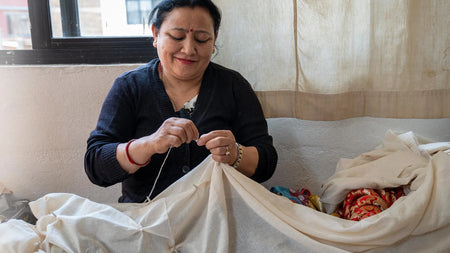Welcome to our global maker-to-market movement where, together with 20,000 artisans, we ignite social change. We create opportunities for individuals, families, and communities in developing countries to thrive through strong relationships, fair wages, safe working conditions, and sustainable practices.

When the going gets tough, the tough put on indigo! In Japan, Samurai warriors would wear Indigo under their armor because of it has anti-microbial properties that aided in the healing of wounds. Additionally, real indigo is flame retardant up to 1,500 degrees Fahrenheit. (Note: please do not test this on your Indigo Kimono Robe. It's cotton, and you'll quickly be without a robe.) Just because indigo is tough doesn't mean you can't throw on the Indigo Kimono Robe and lounge around the house! This robe is crafted by the artisans of Manushi. Translating to mean, "energetic woman," Manushi empowers women to take charge of their own lives through sustainable employment and financial independence.
HANDCRAFTED IN NEPAL
SKU: 5917680

THE MAKERS

Tenthousandvillages.com
